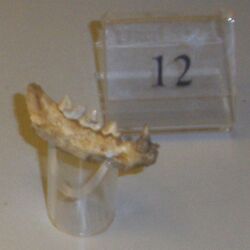Biology:Felis lunensis
| Felis lunensis | |
|---|---|

| |
| Fragment of f. lunensis fossilized jawbone, at Museo di Paleontologia di Firenze | |
| Scientific classification | |
| Domain: | Eukaryota |
| Kingdom: | Animalia |
| Phylum: | Chordata |
| Class: | Mammalia |
| Order: | Carnivora |
| Suborder: | Feliformia |
| Family: | Felidae |
| Subfamily: | Felinae |
| Genus: | Felis |
| Species: | †F. lunensis
|
| Binomial name | |
| †Felis lunensis Martelli, 1906
| |
| Synonyms | |
|
Felis silvestris lunensis | |
Felis lunensis, or the Martelli's cat is an extinct felid of the subfamily Felinae.
Evolution and taxonomy
Around 12 million years ago, the genus Felis appeared and eventually gave rise to many of the modern small cats. Felis lunensis was one of the first modern Felis species, appearing around 2.5 million years ago in the Pliocene. Fossil specimens of F. lunensis have been recovered in Italy and Hungary.[1] Fossil evidence suggests the modern European wildcat Felis silvestris may have evolved from F. lunensis during the Middle Pleistocene.[2] This has resulted in F. lunensis occasionally being considered a subspecies of Felis silvestris.
Felis lunensis first described by Alessandro Martelli in 1906 was a mandible excavated in Pliocene deposits near Olivola in Tuscany.[3] The holotype specimen is now preserved in the collection of the University of Florence in Italy.[4]
References
- ↑ Jump up to: 1.0 1.1 "Felis lunensis". http://paleodb.org/cgi-bin/bridge.pl?action=checkTaxonInfo&taxon_name=Felis+lunensis&is_real_user=1.
- ↑ Yamaguchi, Nobuyuki; Driscoll, Carlos A.; Kitchener, Andrew C.; Ward, Jennifer M.; Macdonald, David W. (2004). "Craniological differentiation between European wildcats (Felis silvestris silvestris), African wildcats (F. s. lybica) and Asian wildcats (F. s. ornata): Implications for their evolution and conservation". Biological Journal of the Linnean Society 83 (1): 47–63. doi:10.1111/j.1095-8312.2004.00372.x. http://www.filogenetica.org/cursos/deluna/morfometria/casos%20de%20estudio/catSkulls.pdf.
- ↑ Martelli, A. (1906). "Su due Mustelidi e un Felide del Pliocene Toscano". Bollettino della Società Geologica Italiana 25: 595–612. https://archive.org/details/bollettinodellas2519soci/page/606.
- ↑ Cioppi, E.; Mazzini, M. (1983). "Part II: Carnivora, Felidae". Atti della Societa Toscana di Scienze Naturali Residente in Pisa. Catalogue of type specimens in the vertebrate collections of the museum of geology and paleontology of the University of Florence (Italy) 90: 227–236. http://cat.inist.fr/?aModele=afficheN&cpsidt=9188603.
Further reading
- Lewis, Mark; Pacher, Martina; Turner, Alana (December 2010). "The Larger Carnivora of the West Runton Freshwater Bed". Quaternary International 228 (1–2): 116–135. doi:10.1016/j.quaint.2010.06.022. Bibcode: 2010QuInt.228..116L.
- Petronio, Carmelo; Angelone, Chiara; Atzori, Pietro; Famiani, Federico; Kotsakis, Tassos; Salari, Leonardo (15 October 2020). "Review and New Data of the Fossil Remains from Monte Peglia (Late Early Pleistocene, Central Italy)". Rivista Italiana di Paleontologia e Stratigrafia 126 (3). doi:10.13130/2039-4942/14413.
- Allred, Alexandra Powe (May 14, 2014). Cats' Most Wanted: The Top 10 Book of Mysterious Mousers, Talented Tabbies, and Feline Oddities. Potomac Books. ISBN 9781612342931.
Wikidata ☰ Q5442094 entry
Template:Feline-stubTemplate:Paleo-carnivora-stub
 |

